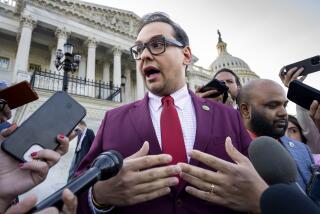Bush can get away with it
Even war criminals have fan clubs. On Tuesday, 15,000 people in Belgrade, Serbia, protested the transfer of indicted war criminal Radovan Karadzic to the International Criminal Tribunal at The Hague. Karadzic is implicated in torture, rape, murder and genocide, but to some self-styled Serbian patriots, these are mere details. “Long Live Radovan!” chanted the protesters.
For the many Americans who read of Karadzic’s arrest but wondered, “Yes, great -- and when will George W. Bush and Dick Cheney face trial for war crimes?” this is something to keep in mind. Karadzic was the leader of a small, unrecognized rogue republic and presided over a genocide -- but he evaded justice for more than a decade and still keeps a loyal fan base.
Bush and Cheney are the leaders of the most powerful state in the world, and their misdeeds, though egregious, aren’t on the same level as Karadzic’s. (Unless -- ahem -- you count the Iraq war, on the “it was all a tissue of lies” theory. But for the sake of the argument, let’s give them the benefit of the doubt.) So no one should be surprised that there’s still a Bush fan club (albeit a small one) or that the prospects of criminal proceedings against the president and his henchmen are virtually nonexistent.
It’s not that Bush, Cheney and Co. don’t deserve to end up in the dock. Retired Army Maj. Gen. Antonio Taguba, who was commissioned by the Pentagon in 2004 to investigate the abuses at Abu Ghraib, recently concluded that “the commander in chief and those under him authorized a systematic regime of torture. ... A government policy was promulgated to the field whereby the Geneva Conventions and the Uniform Code of Military Justice were disregarded. ... There is no longer any doubt as to whether the current administration has committed war crimes.”
The human cost of those crimes? It’s hard to say for sure, given the administration’s penchant for secrecy (understandable, because the president was warned as early as January 2002 of “the threat of domestic criminal prosecution under the War Crimes Act” by his then-chief counsel, Alberto Gonzales). But when the nongovernmental Detainee Abuse and Accountability Project examined thousands of pages of internal government records, it documented more than 330 cases “in which U.S. military and civilian personnel are credibly alleged to have abused or killed detainees” at “U.S. facilities throughout Afghanistan, Iraq and at Guantanamo Bay.”
A McClatchy Newspaper Group report released a few weeks ago came to a similar conclusion, finding that brutal mistreatment of prisoners was routine in Afghanistan and at Guantanamo, even though in many cases the abused detainees had no ties to Al Qaeda.
Did all this violate U.S. and international law? You betcha. The U.S. is party to the U.N. Convention Against Torture, and torture is also a federal crime. At the time most of the abuses were committed, the War Crimes Act also criminalized violations of Common Article 3 of the Geneva Conventions, which prohibits “cruel treatment and torture [and] outrages upon personal dignity.” And under the doctrine of “command responsibility,” senior civilian and military leaders could all face criminal liability for authorizing or tolerating the abuses.
But don’t hold your breath. As far back as 2001, administration lawyers were crafting legal opinions designed to shelter their bosses from any future criminal liability, and much evidence has since been hidden and destroyed. Then in 2006, the GOP-dominated Congress amended the War Crimes Act -- with retroactive effect -- to make future prosecutions almost impossible.
In any case, neither Democrats nor Republicans have the stomach for criminal proceedings against high-ranking current or former officials who still retain substantial public support. Meanwhile, no international tribunal is ever likely to have jurisdiction over the U.S. participants involved in the abuses.
But that doesn’t mean we should give up on accountability. John McCain and Barack Obama should be urged to establish a high-level, nonpartisan “truth commission” with robust subpoena powers early in 2009. That commission should investigate, hold hearings and issue a public report on responsibility for torture, war crimes and other abuses committed during the Bush administration.
Such a panel wouldn’t satisfy those who’d like to see Bush and Cheney in prison garb, but it would be a major step toward undoing the damage the administration did to our reputation as a nation committed to human rights. And as more incriminating details come out -- and they will -- some Bush-Cheney fan club members might even turn in their membership cards.
--
More to Read
Get the L.A. Times Politics newsletter
Deeply reported insights into legislation, politics and policy from Sacramento, Washington and beyond. In your inbox three times per week.
You may occasionally receive promotional content from the Los Angeles Times.










